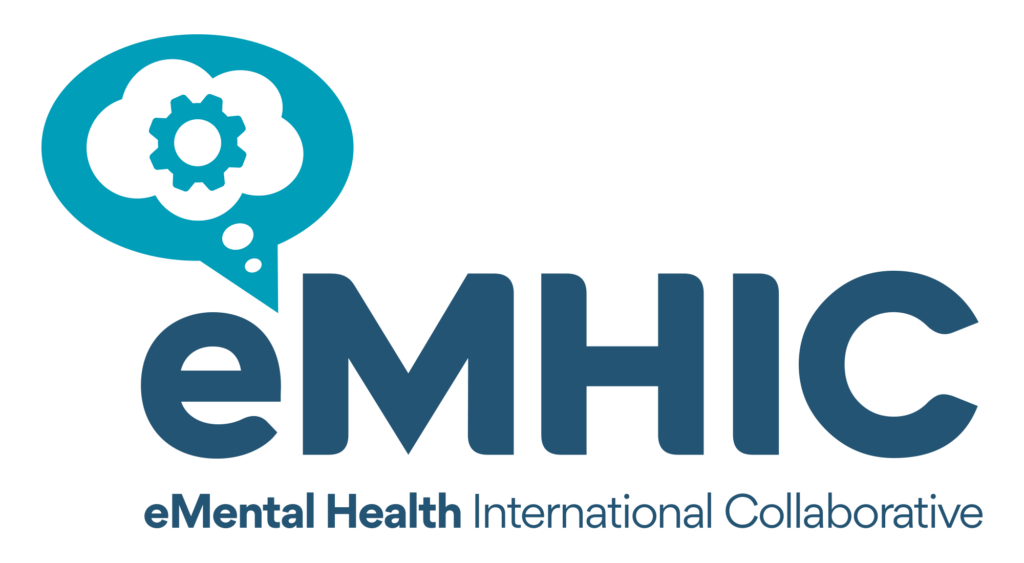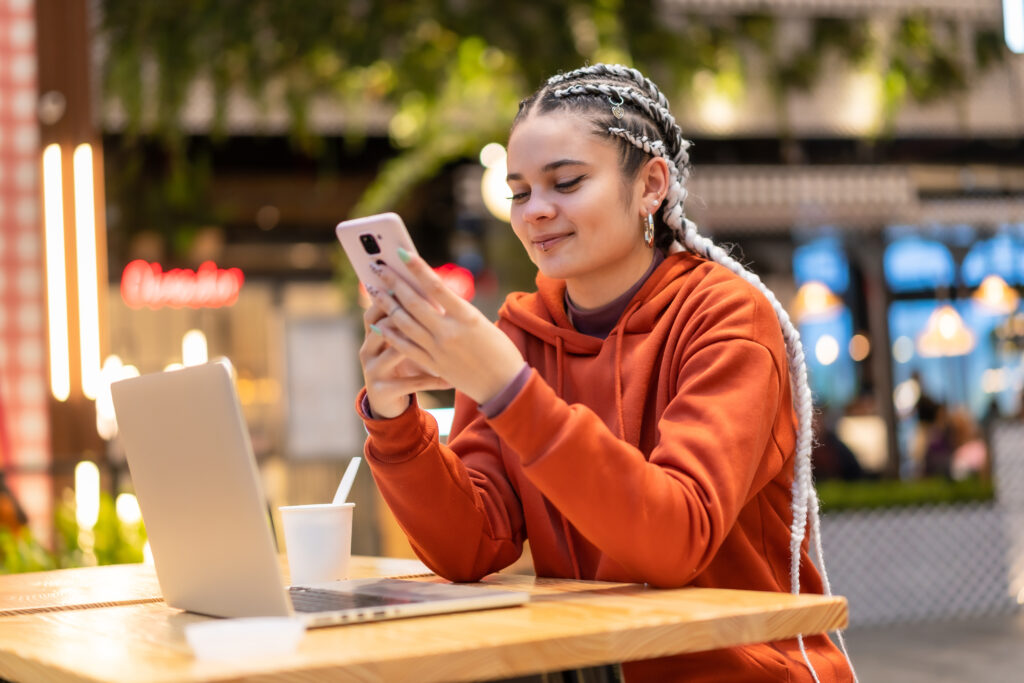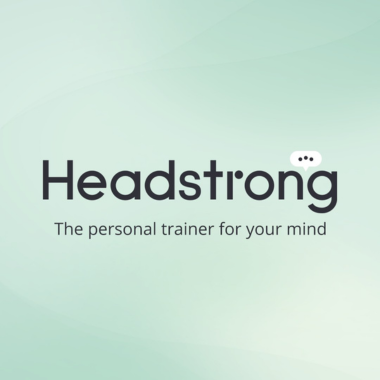Building mental resilience to counter ill mental health
For a small country, Aotearoa New Zealand punches above its weight when it comes to e-mental health. As in many other countries, the mental health of young people is a topic of growing concern. One in five young people experience high or very high levels of psychological distress, and nearly one in four experience anxiety, depression, and fatigue.
Young people in New Zealand are diverse, innovative, and smart – meeting their mental health needs requires solutions that share these qualities and provide effective, timely support. Discerning digital natives, they are selective in what tools they will engage with and are active users rather than passive consumers of digital content.
Enter Headstrong, a new e-mental health tool developed by researchers at the University of Auckland’s Faculty of Medical and Health Sciences. Originally funded by A Better Start/E Ripu Te Rea (National Science Challenge), Headstrong was developed collaboratively with rangatahi (young people) and provides engaging, effective and practical support to young people. It is designed to be a ‘personal trainer for your mind’ and it’s fits into the primary prevention and early intervention space.
The ethos behind Headstrong is simple: meet young people where they are with culturally-responsive, evidence-based and genuinely helpful tools to increase resilience and build the skills they will need to navigate the ups and downs of life.
What is Headstrong?
Headstrong is a wellbeing mobile app (and is also available on any device via a web browser). It’s a chatbot companion that supports young people (aged 12-17) in building wellbeing by teaching skills for navigating day-to-day challenges. It uses rule-based logic to converse with users to teach skills, give users the chance to practise them, and guide them through various strategies to tackle whatever life throws at them.
Young people report they enjoy the confidential nature of Headstrong, which provides a way to find out more about and seek support for issues they may feel some shame or embarrassment discussing with a real person.
Technology
Headstrong is a chatbot system which supports efficient dialogue content authoring, including by non-technical domain specialists such as researchers and clinicians. The conversational engine uses conditional logic over a wide variety of user variables and delivers pre-programmed chat to users via a messenger user interface over both native app and web browser platforms.
Messaging supports quick option-based and free text user input as well as in-chat image, audio and video media, quizzes, and webview among other features.
Natural language understanding of free text user input includes analysis of intent, sentiment and named entities and includes detection of clinically significant user expressions which might warrant more immediate support. User privacy is maintained by not storing any personally identifiable information from conversations – this data remains anonymous.
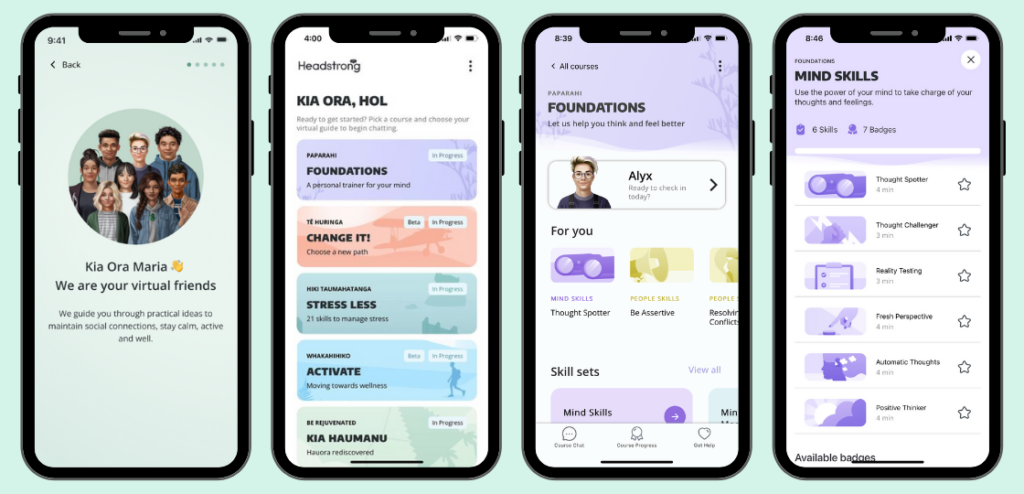
What does Headstrong provide?
Headstrong has five short courses, each with a different focus. Users can select what they’re most interested in. Providing expert advice in a friendly, easily-digestible format, course content was chosen based on what rangatahi identified their greatest wellbeing needs were and what they would be most receptive to seeking support for.
These courses are:
Foundations – a basic course to improve overall wellbeing, including tips and tools to practise mindful meditation, take charge of unhelpful thoughts and feelings, boost confidence and self-esteem and handle the ups and downs that come with relationships.
Stress Less – a course to support young people to manage their feelings, reframe stress, understand anxiety and learn some easy relaxation techniques. This course helps users to take control of their thoughts and identify (and let go of) unhelpful patterns.
Kia Haumanu – well-being rediscovered through a Māori worldview. Users can explore Māori concepts including mātauranga (Māori knowledge), mauri (life force), karakia (prayer), waiata (song) and haka (ceremonial dance), focus on the positive with Tū Mahi (activities) and learn self-care. It also includes extra guidance for seeking support specifically for rangatahi Māori.
Change It! – a course that takes a harm-minimisation approach to substance use and addiction. Users can learn more about, for example, vaping, and are guided to make safe choices for their wellbeing. Those living with addiction can find modules to keep cravings and urges in check, change habits, and lower stress and anxiety, thereby paving the way for lasting change.
Activate – a course to help develop or boost body confidence (and appreciate what our bodies do), focus on the positive, and create sustainable exercise habits.
How does Headstrong work?
Headstrong is a ‘personal trainer for your mind’, designed to encourage users to check in regularly and grow their skills. Each step takes only a few minutes. Young people can use it however and whenever they like, with feedback suggesting users prefer to use it when they feel stressed or down. When users are in a less-positive headspace, data shows they tend to use it for an extended period.
This suggests that for those working with young people (and/or their family/whānau) can share the app with young people who are struggling and guide them toward the course that best suits their needs at that moment.
Who is behind Headstrong?
Headstrong is a partnership between the University of Auckland researchers, software developers at Kekeno Tech, and the UX design studio, Edition Group. Funding from Te Whatu Ora guarantees that Headstrong is free to everyone in Aotearoa New Zealand. This is crucial because it ensures that cost isn’t a barrier to accessing this support. To improve accessibility further, in 2023 we made Headstrong available via web browser in addition to the native app. The web application can be accessed on any device, including a desktop computer, without downloading anything.
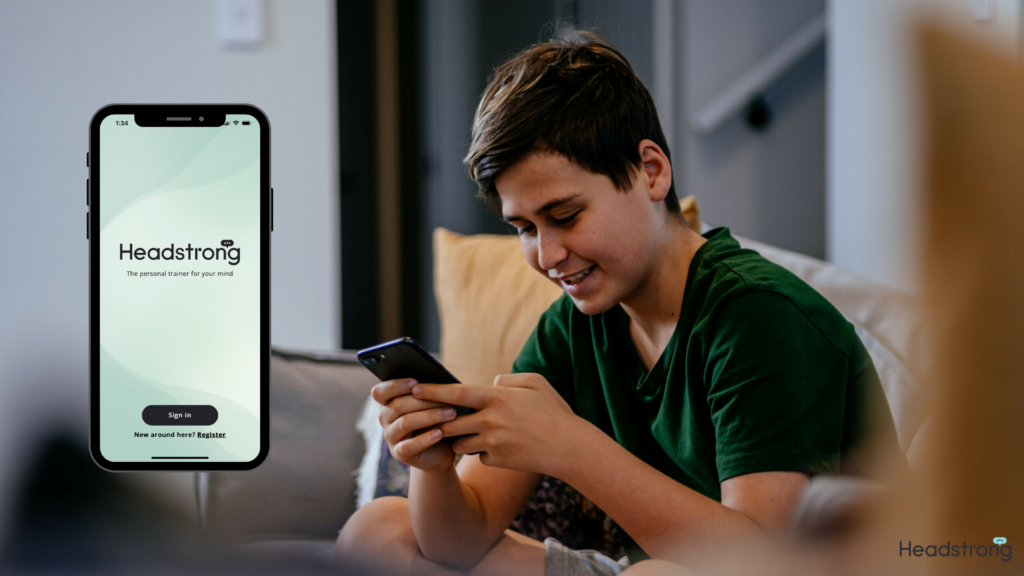
The future?
The landscape of e-mental health support is rapidly evolving, necessitating that apps like ours not only keep pace with technological advancements but also remain attuned to the changing preferences of our users. We use agile methodology, which means our work is a continuous journey of improvement and adaptation rather than a final destination. There is always room to innovate, expand our offerings, and enhance the user experience.
Recognising the potential for new content creation, we want to foster collaborations with health researchers, postgraduate students, and youth mental health organisations. If you’re interested in exploring potential collaborations, please don’t hesitate to reach out.
One example of a significant innovation we must consider is the use of Generative AI (GenAI) in mental health chatbots. Imagine chatbots that don’t just follow a script but converse more naturally; this is what our research shows users want. So, we aspire to evolve the user experience in Headstrong so conversations with the chatbot still offer programmed evidence-based advice and safety controls but are blended with more personalised conversational touches that Generative AI can create. Getting a balance like this right isn’t without its challenges. We need to ensure that an advanced chatbot would understand and respond to users’ input accurately, while keeping their conversations private, secure, and safe. Nevertheless, the future for digitally-enhanced mental health support is exciting and it is worthwhile exploring how GenAI can make chatbots more engaging, understanding, and helpful. In the public Headstrong release to date, we have exclusively used pre-programmed dialogue. Given the progress of generative AI emergent in 2023 we have integrated this technology into the system and can support dynamic response generation – leading to more natural, specific and personalised conversational responses – and begun to evaluate it in research contexts for quality, safety and feedback in general.
Spread the word
Headstrong is only helpful when people know it’s available and can access it when needed. We hope adults working with young people explore the courses by downloading the app or visiting www.headstrong.org.nz, allowing them to talk with young people about Headstrong more confidently. We have physical and digital resources designed to promote the app. These can be ordered from the website.
The potential of Headstrong is almost limitless. The young people we work with are brimming with ideas about what else could be included and how we can build and sustain this important work. In a world where so many of us are asking how to support the mental health of young people and how to equip them to face an uncertain future, Headstrong can help provide an answer for many.
References
- https://www.health.govt.nz/publication/annual-update-key-results-2022-23-new-zealand-health-survey
- https://www.salvationarmy.org.nz/research-policy/social-policy-parliamentary-unit/state-nation-2023
